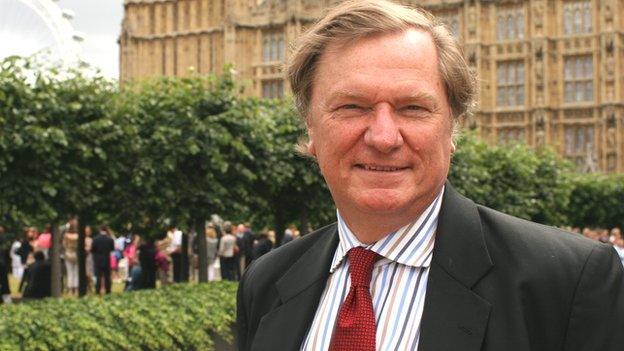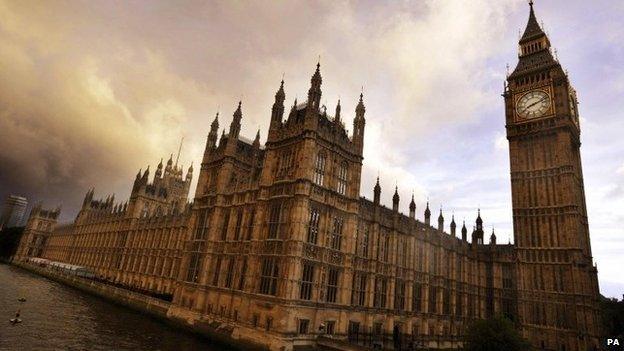Is there an appetite for devolution in the East Midlands?
- Published
- comments

It was a big shock for me to discover that it's 37 years - yes 37 years - since the comedy smash Citizen Smith hit our TV screens.
The role of Wolfie, the young revolutionary from Tooting, was immortalised by Ilkeston's very own Robert Lindsay.
"Power to the People" was his rallying call at the end of each show.
Well, could that rallying call be given a reprise, not only on the streets of Ilkeston, but throughout communities in the East Midlands?
Transferring powers from Whitehall and Westminster to areas closer to home is back on the political agenda. The ripples of the Scottish referendum vote and the promise of shifting big powers to the Edinburgh parliament has begged the question: "What about England?".
'Beefed up' powers
This is meat and drink for Labour's Graham Allen. The Nottingham North MP has been pressing for wholesale change in how our country is governed, and to give local councils greater clout.
"That will be liberating, and it will give local government the sensitivity to engage with local people and spend money more accurately locally. All we can do at the moment is implement the stuff that comes down the pipe from Whitehall," he told the House of Commons.
Graham Allen is the chair of an influential committee of MPs that's been investigating what powers should be devolved to local councils.

Graham Allen is a longstanding campaigner for decentralisation
"It's good to give local government some authority, but the experience of Scotland has shown how a government can suck powers from the localities if they are not entrenched and guaranteed in writing: not just in law, but in a constitution.
"I've been worried that the vision needed to get on this road has been lacking."
It's 10 years since the voters of north east England rejected proposals for regional government. It was John Prescott's big plan to roll out directly-elected regional assemblies with "beefed up" economic powers.
But the offer on the table was given the thumbs down in the referendum.
At the time, the East Midlands had its own regional assembly and EMDA, external, the economic development agency. Remember how they wanted the East Midlands to be in the top 20 richest European regions and how it could "flourish" by 2020?
Key time
The regional agenda was scrapped with the arrival of David Cameron in Downing Street. The mantra since 2010 has been "localism": giving local councils greater control, for example on planning issues.
So after the Scottish referendum, what form of devolution can the English regions expect?
The debate comes at a key time for the East Midlands.
There's a sense that the Midlands is in danger of being squeezed out of influencing big political and funding decisions.
That's because of the sharper elbows of a resurgent block of Northern cities, the so-called 'Northern Powerhouse', and the influence of London and its city mayor.
But does that necessarily mean there's an appetite for reheating the idea of the old regional assembly? The reality for the East Midlands may be a tussle for enhanced powers between the cities and the shire counties.

A recent report suggested releasing local authorities from the 'fiscal grip' of central government
The City Mayor of Leicester, Sir Peter Soulsby, wants more local tax-raising powers, while the leader of Derbyshire County Council, Anne Western, is already galvanising local district councils into sharing the provision of services.
Nottingham is recognised by the government as a core city: one of the eight biggest cities in England, and gets extra economic funding as a result. It's already extending its reach beyond its old city borders on transport and housing matters.
One clue to where we're going may come from Heather Wheeler, MP for Derbyshire South. The Conservative is a former council leader for south Derbyshire and is a member of the Commons' Communities and Local Government Committee.
As she told a Commons debate: "We want councils and communities to have powers to shape their own futures and for their feelings to be given more weight than has happened in the past."
One of the committee's recent reports - "Devolution for England: The case for local government" - called for the transfer of a range of tax-raising powers to councils, among them business rates and stamp duty.
It also suggested "releasing groups of local authorities - centred on large city and county regions - from the fiscal grip of Whitehall."
So could city or county regions re-energise local democracy, boost economic performance and lead to a more balance growth across the country?
That's certainly the thinking among many East Midlands politicians. But is the public ready and has it the appetite for the rallying cry from a 21st Century Citizen Smith?
Let me know, external what you think about devolving more powers from Whitehall to the East Midlands.
There will be a special East Midlands Today, external debate screened on BBC One on 5 November - after the BBC News at Ten.